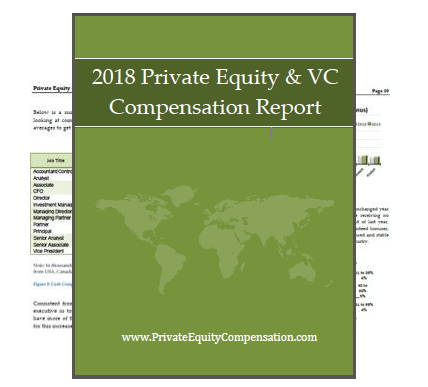In 2018, private equity and venture capital firms face new challenges even as they strive to overcome existing headwinds.
These new challenges include carried interest, data management, environment and social governance (ESG) and pre-existing issues such as transparency, fund structure, fund raising and market conditions, just to name a few.
However important these issues may be for the future of the private equity and venture capital industry, the goal of this report is to quantify, to the extent possible, how industry trends affect compensation in the industry.
This year heralds the fourth straight year of gains in the private equity and venture capital industry. A mere 6 percent of this year’s respondents have reported an expectation of lower earnings this year.
We have observed a number of potential trends in this year’s compensation report, one of which is increasing base salaries and declining bonuses as a percentage of overall compensation for private equity and venture capital professionals in the highest pay band.
The correlation between bonus pay and firm performance continues to diminish. Through 2013, our research had routinely confirmed the principle that exceptional performance was rewarded with a grand bonus. In 2015, we saw this principle tested; in 2016, we saw it proved erroneous, and in 2017, it became apparent that the absence of correlation is the new normal. In this 2018 report, we see that respondents employed in firms whose performance is down by 1 to 9 percent still forecast an average bonus of $161,000.
In last year’s report, we identified movement in a positive direction with respect to the quality of training our respondents receive in-house. We have seen that revert back in this year’s report.
Our annual review of MBA base and bonus compensation, as well as vacation time, shows a return to more favorable treatment in both base and, to a lesser extent, bonus pay for respondents with an advanced degree.
For job seekers, this report reveals which positions are in demand, what percentage of firms are hiring, and what percentage are cutting back. For example, 25 percent of respondents’ firms are hiring accounting personnel, but just 11 percent are hiring investor relations staff.
In short, the 2018 Private Equity and Venture Capital Compensation Report confirms a few commonly held truths and eliminates the occasional misconception. Its graphs, charts, and the corresponding analysis serve to provide readers insightful, industry-specific information regarding the complex subject of compensation.
Other highlights from this year’s report include:
- Small-sized firms saw the largest increases in base pay;
- Fund raising has become the number one job security concern among survey respondents;
- PE Small-Cap continues to be the most favored investment strategy;
- Private equity and venture capital professionals working in the largest firms continue to out-earn peers in smaller firms; and
- The share of personal carry, as a percentage, increases in direct proportion to the individual’s level of investment decision input and work experience.
Get the Full Private Equity & VC Compensation Report
This year’s compensation report is primarily made up of responses from North America and the U.K., with about a third representing senior level positions and nearly a half of responses representing mid-level positions.
To learn more about compensation trends and benchmarks, you have 2 options:
1. Purchase this year’s full report at Private Equity & VC Compensation Report
or
2. Become a Private Equity Jobs Digest Premium member and get the complimentary version of the report for no charge.

